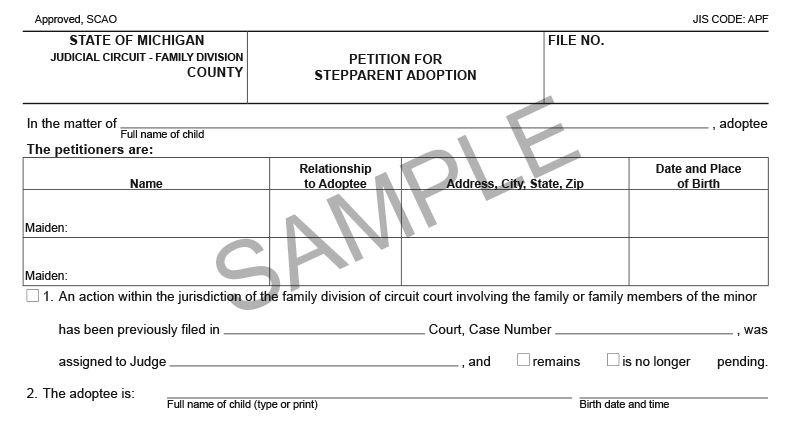Step-parent adoption is a profound journey that not only legalizes the relationship between a step-parent and their step-child but also solidifies emotional bonds. It involves a legal process by which a step-parent assumes legal responsibility for their spouse’s child. This process alters the child’s birth certificate, replacing the non-custodial parent’s name with that of the adopting step-parent, and confers all the responsibilities and rights of a biological parent.
Understanding Step-Parent Adoption
Step-parent adoption varies significantly between different jurisdictions, but it typically requires the consent of both biological parents, unless the non-custodial parent has abandoned the child, is deceased, or is otherwise unfit or unable to give consent. In some cases, the court may waive the need for one parent’s consent, particularly if that parent has not been involved in the child’s life for a significant period.
The process begins with the step-parent filing a petition for adoption in the family court. This document outlines the step-parent’s desire to adopt the child and usually includes details about the living situation, the relationship between the child and the step-parent, and the biological parent’s stance on the adoption.
Legal Requirements

The requirements for step-parent adoption are stringent and are designed to protect the best interests of the child. These include:
Consent: As mentioned, the consent of the non-custodial biological parent is typically required unless legally waived.
Home Study: Some jurisdictions require a home study to assess the suitability of the child’s living conditions. However, many states waive this requirement for step-parent adoptions, acknowledging the existing relationship and living situation.
Legal Representation: Parties often need legal representation to navigate the complexities of family law. The step-parent may need an attorney to file the necessary paperwork and represent their case in court.
Emotional Considerations
The emotional aspect of step-parent adoption is as significant as the legal process. For many children, the adoption can feel like a reaffirmation of the step-parent’s commitment and love. It can enhance the child’s sense of security and belonging within the family unit.
However, step-parent adoption can also stir complex emotions, particularly if the non-custodial biological parent is still involved in the child’s life. It’s crucial for the adopting parent and the custodial biological parent to communicate openly with the child about their feelings and the implications of the adoption.
The Role of the Non-Custodial Parent
The non-custodial parent’s role in this process can vary widely. In some situations, they may agree to the adoption because they recognize the benefits it offers to their child, including stability and legal rights. In other cases, the non-custodial parent might oppose the adoption, which can lead to legal battles and emotional stress for all parties involved.
In instances where the non-custodial parent consents to the adoption, it’s often helpful to maintain an open line of communication if they are still involved in the child’s life, to preserve that relationship.
After the Adoption
Once the adoption is finalized, the step-parent has the same legal rights and responsibilities as a biological parent. This includes the right to make decisions regarding the child’s education, health care, and other important aspects of their life. The child also gains rights, such as inheritance rights and the right to be covered under the step-parent’s health insurance.
The finalized adoption often brings a new sense of unity to a family, but it’s essential to continue nurturing the family dynamics. Families should strive to address any emerging challenges openly and with compassion, ensuring all family members, including children from previous relationships, feel valued and included.
Step-parent adoption is a meaningful step that can strengthen the bonds within a blended family. It requires careful consideration of legal, emotional, and relational factors. For those considering step-parent adoption, it’s advisable to seek comprehensive legal advice and consider counseling to support the family’s emotional health through this significant transition. The journey might be complex, but the outcome can solidify a loving and secure family relationship that lasts a lifetime.
Using a Family Law Attorney for Step Parent Adoptions
In the context of step-parent adoptions in Michigan, engaging a family law attorney is crucial due to the complex and sensitive nature of the legal proceedings. These attorneys play an indispensable role in guiding step-parents through the intricate process, ensuring that all legal requirements are meticulously met.
They help navigate the challenges of obtaining necessary consents or waivers from non-custodial biological parents, which can be fraught with emotional and legal complexities.
Furthermore, a family law attorney adeptly handles all necessary filings and court representations, safeguarding the interests of the step-parent and the child. Their expertise extends beyond just managing legal documents; they provide valuable counsel on how to address the emotional responses and changes in family dynamics that often accompany such transitions.
By securing an attorney’s services, step-parents can ensure that the adoption process respects legal protocols while fostering a nurturing environment for the child. This professional guidance is vital in transforming the adoption journey into a successful and affirming family milestone.




